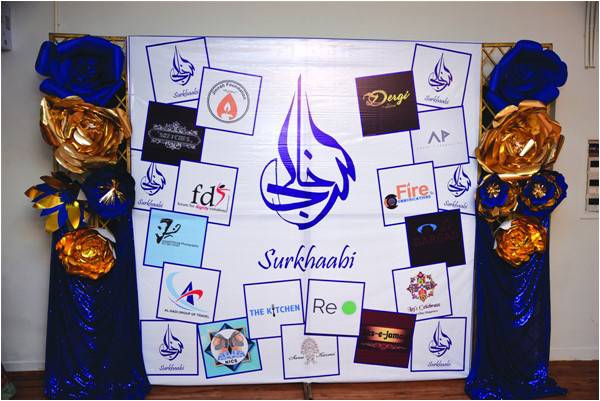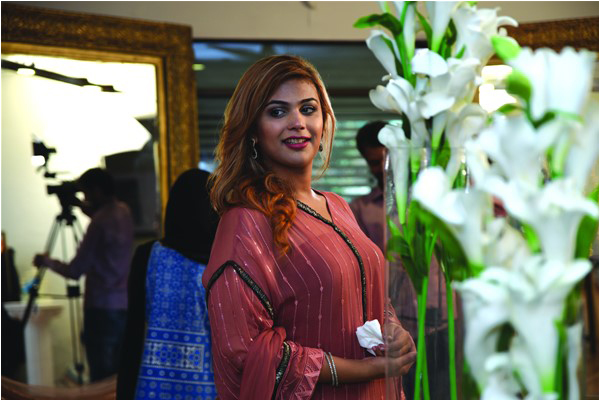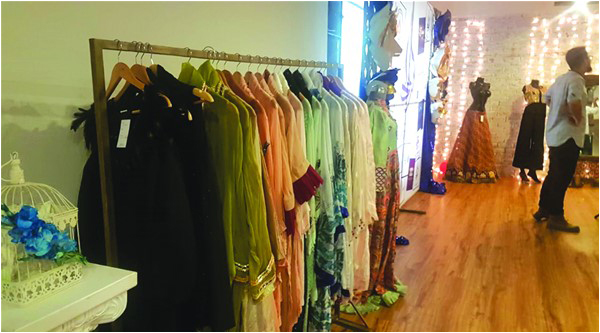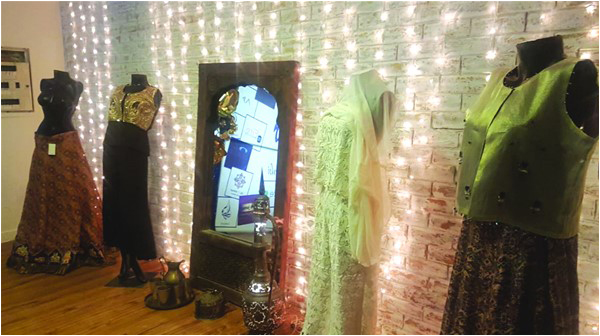
In a room full of clothes, the designer and assistant dress up mannequins. Models wait in line to get their makeup done. This exhibition looks like any other brand launch. But it isn’t.
This designer and her models are all members of Pakistan’s transgender community.
Maya Zaman and Fauzia Shahib launched their brand Shurkhaabi. This is the first trans-owned fashion label in Pakistan but the owners do not want that label. “Our work should speak for what it is,” they say.
Derived from the phrase “Shurkhab kay Paar”, Shurkhaabi is a new venture initiated by a trans- and a cis-gender female.

When one thinks about the empowerment of the transgender people in the country, their economic conditions and lack of educational opportunities play a large role in determining their current position.
“We do not have jobs. We don’t have chances and we don’t have opportunities. This is what we hear all the time,” says Maya Zaman, the trans designer in the duo.
Maya claims that the venture not only aims to promote body positivity for all but also hopes to open new avenues for the trans-people of Pakistan, “Because I am in a position to give other trans a stepping stone, I worked on this idea and hope it delivers,” she says.
Maya, who is originally from Karachi, did her bachelors from Iqra University and her diploma in textile designing from the National Institute of Cultural Studies (NICS). A lesser known fact is that the NICS provides scholarships for transgender individuals and Maya won the scholarship through Forum for Dignity Initiative (FDI), a non-profit for the welfare of transgender people in Islamabad. Maya is also a member of the advisory committee in FDI.
At NICS, Maya met with her current business partner Fauzia.
Fauzia is a housewife and feels very comfortable working with Maya, “I wanted to work with Maya to remove the bad labels given to the trans people in society. I think Maya is a role model for the trans community and I want to support her.” Fauzia says that due to her interaction with Maya, her outlook towards the trans community changed, hence she hopes the brand will do the same.


The duo might agree on the idea but are polls apart when it comes to style. While Maya likes Western cuts, Fauzia still roots for Eastern culture. But both agree that their traditional fashion values are somewhat dying out, “We are bringing back all the handwork, the traditional cuts with Western fusion, of course (winks Maya),” agrees the trans-cis duo.
Keeping true to her trans roots, Maya has tried incorporating as many trans people into her production system as possible. She and her partner are helping them to develop their skills: “Whatever the things that make a brand what it is – we have given first priority to women and trans people, be it the tailoring, the adda work, marketing or modelling. In a way every trans person is now our brand ambassador,” says Maya. She believes that her models can now use their portfolios to get better work in the industry.
The models at the event agree that Shurkhaabi has touched the feminine side of many trans women and they have used it wisely, “The workers get excited while creating each piece of cloth,” laughs Maya recalling how they want to try out and wear everything they create. The clothes range between 2,000 to 20,000 rupees in cost. They are styled according to the preferences of contemporary youth in Pakistan but also have that hint of tradition in them. Multicoloured skirts, feathered tops in sizes up to size 18, Shurkaabi takes the idea of looking good for all shapes, sizes and lengths seriously, “Our youth is under pressure to not wear a certain type of clothing item because they might look darker, fatter or whatever standards of beauty have been set by our society. We want to remove colour shaming, fat shaming and celebrate diversity in its true meaning,” says the 24-year-old Maya.
Maya and Fauzia want to undertake bridal designing soon and trust that the society will be accepting of their new venture. “If four people opposed us in the past, only two will now. We will take criticism for its face value and work on it, but we want our customers to come in with an open heart and mind and look at the kind of work we deliver,” they say.
This designer and her models are all members of Pakistan’s transgender community.
Maya Zaman and Fauzia Shahib launched their brand Shurkhaabi. This is the first trans-owned fashion label in Pakistan but the owners do not want that label. “Our work should speak for what it is,” they say.
Derived from the phrase “Shurkhab kay Paar”, Shurkhaabi is a new venture initiated by a trans- and a cis-gender female.

When one thinks about the empowerment of the transgender people in the country, their economic conditions and lack of educational opportunities play a large role in determining their current position.
“We do not have jobs. We don’t have chances and we don’t have opportunities. This is what we hear all the time,” says Maya Zaman, the trans designer in the duo.
Maya claims that the venture not only aims to promote body positivity for all but also hopes to open new avenues for the trans-people of Pakistan, “Because I am in a position to give other trans a stepping stone, I worked on this idea and hope it delivers,” she says.
"Our youth is under pressure to not wear a certain type of clothing item because they might look darker, fatter or whatever standards of beauty have been set by our society. We want to remove colour shaming, fat shaming and celebrate diversity in its true meaning," says the 24-year-old Maya
Maya, who is originally from Karachi, did her bachelors from Iqra University and her diploma in textile designing from the National Institute of Cultural Studies (NICS). A lesser known fact is that the NICS provides scholarships for transgender individuals and Maya won the scholarship through Forum for Dignity Initiative (FDI), a non-profit for the welfare of transgender people in Islamabad. Maya is also a member of the advisory committee in FDI.
At NICS, Maya met with her current business partner Fauzia.
Fauzia is a housewife and feels very comfortable working with Maya, “I wanted to work with Maya to remove the bad labels given to the trans people in society. I think Maya is a role model for the trans community and I want to support her.” Fauzia says that due to her interaction with Maya, her outlook towards the trans community changed, hence she hopes the brand will do the same.


The duo might agree on the idea but are polls apart when it comes to style. While Maya likes Western cuts, Fauzia still roots for Eastern culture. But both agree that their traditional fashion values are somewhat dying out, “We are bringing back all the handwork, the traditional cuts with Western fusion, of course (winks Maya),” agrees the trans-cis duo.
Keeping true to her trans roots, Maya has tried incorporating as many trans people into her production system as possible. She and her partner are helping them to develop their skills: “Whatever the things that make a brand what it is – we have given first priority to women and trans people, be it the tailoring, the adda work, marketing or modelling. In a way every trans person is now our brand ambassador,” says Maya. She believes that her models can now use their portfolios to get better work in the industry.
The models at the event agree that Shurkhaabi has touched the feminine side of many trans women and they have used it wisely, “The workers get excited while creating each piece of cloth,” laughs Maya recalling how they want to try out and wear everything they create. The clothes range between 2,000 to 20,000 rupees in cost. They are styled according to the preferences of contemporary youth in Pakistan but also have that hint of tradition in them. Multicoloured skirts, feathered tops in sizes up to size 18, Shurkaabi takes the idea of looking good for all shapes, sizes and lengths seriously, “Our youth is under pressure to not wear a certain type of clothing item because they might look darker, fatter or whatever standards of beauty have been set by our society. We want to remove colour shaming, fat shaming and celebrate diversity in its true meaning,” says the 24-year-old Maya.
Maya and Fauzia want to undertake bridal designing soon and trust that the society will be accepting of their new venture. “If four people opposed us in the past, only two will now. We will take criticism for its face value and work on it, but we want our customers to come in with an open heart and mind and look at the kind of work we deliver,” they say.

